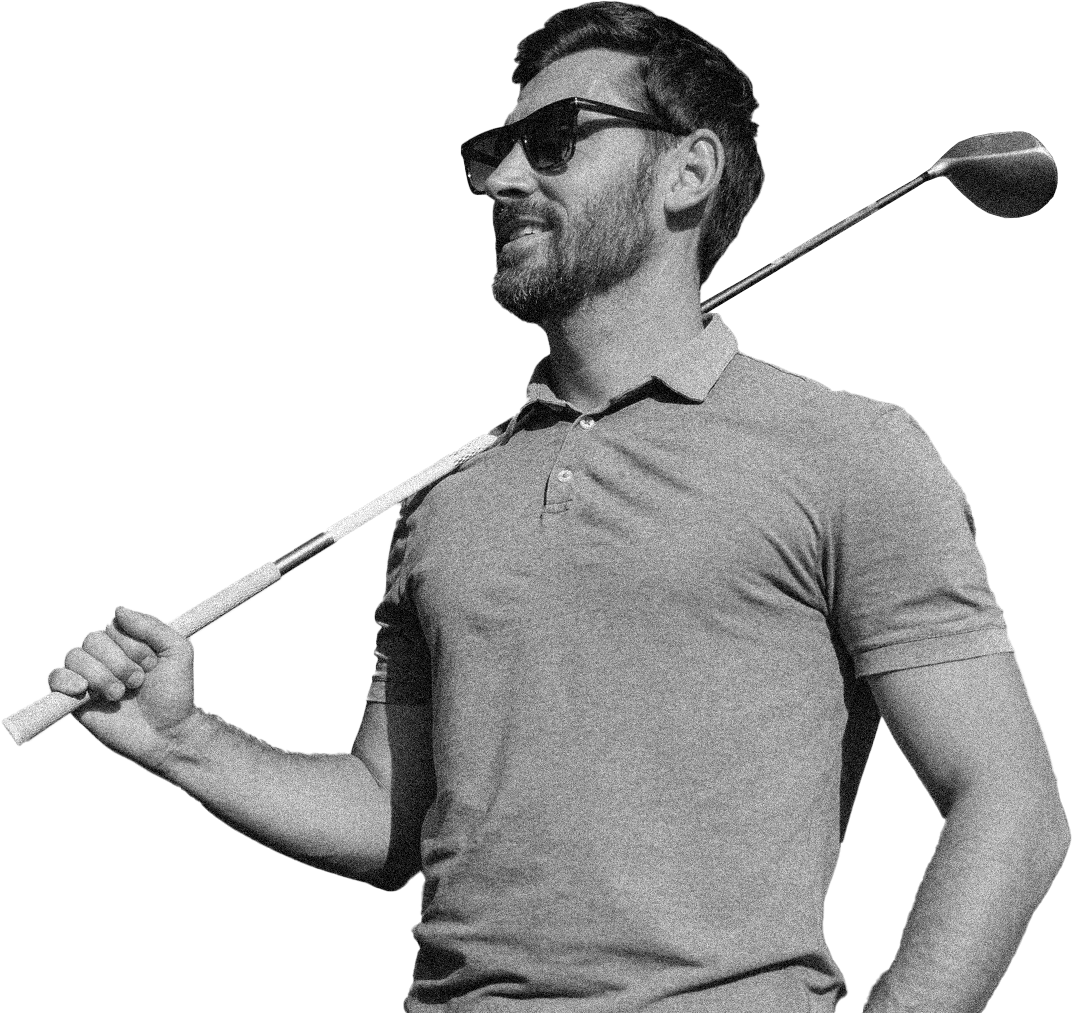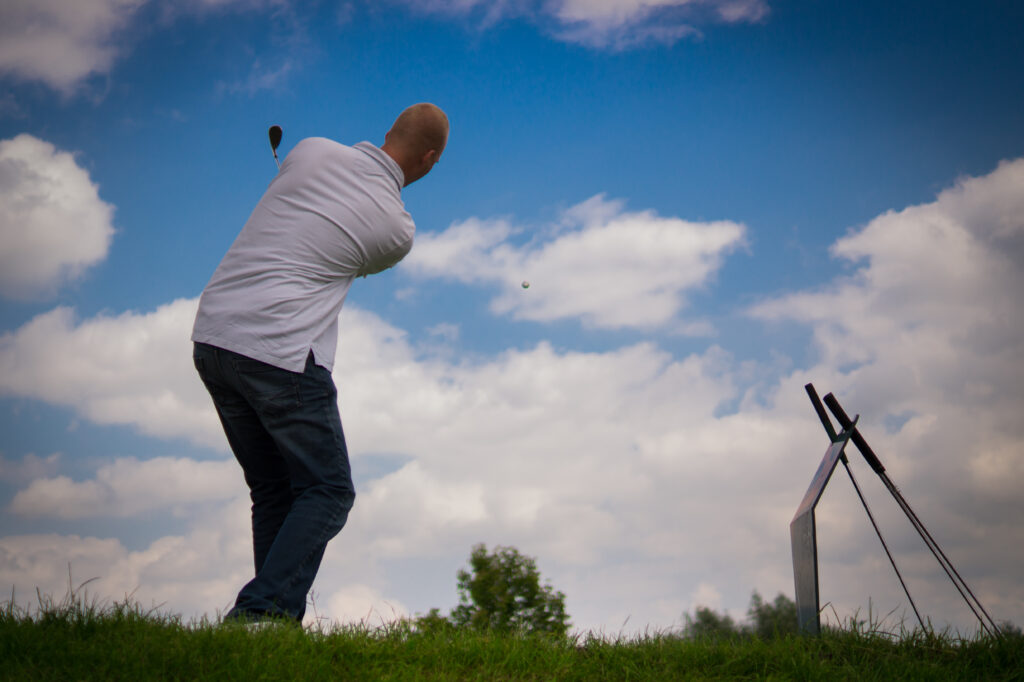I read a blog post recently in Entrepreneur Magazine by Marilisa Barbieri about the mannerisms and behavior characteristics of her clients. And what makes her clients successful. As I read the piece, it was obvious I experience and see firsthand the same behaviors giving golf lessons in Orlando to my clients who perform at their best. I’m not saying they score better than others. But they do exhibit many, if not all of the behaviors mentioned below. Let’s look at 8 ways to become a better golfer and how you can use one, if not all, to be the best golfer you can be
1. Value the Process of Learning
Golf seems to be a complicated to most. But when you boil it down to the nitty gritty, simple physics and your real abilities to make physics work for you is what will determine how well you play the game. When I coach a client who wants to learn what they are capable of, improvement happens immediately. And when a client wants to learn the simple physics of the game and how to set up to allow physics to happen, a lot more improvement happens.
These clients also immerse themselves in learning methods and theories that are contradictory to their own beliefs. Why? Because understanding more than what you want to know is going to assist in the process of you evolving your learning process. And in turn, understanding that there is more than one way to achieve the results you’re after. Their list of ways to improve is a lot more than this list of 8 ways to become a better golfer.
Most of the amateur golfers who are my clients come to me with a basic knowledge of what a swing should be. But very little knowledge of how to use that knowledge to be a better golfer. There’s more to learn than just the ideal positions of a golf swing. Learning to be a better golfer includes understanding golf course architecture, club design, equipment advancements, and playing strategies. But you must have a priority system in place to properly order your learning curve so it can be most effective. This is where great coaching can make a difference.
All great athletes surround themselves with the best coaches they can find. And the relationships they have with their coach(s) is a dialogue, bouncing ideas and new ways to improvement off each other within a priority system the athlete and the coach agree upon. The relationships I have with my client athletes are always evolving around their life priorities as well as their golf goals. It’s the relationship we share that allows us both to learn from each other, maximizing my clients’ ability to reach their potential faster than they anticipated.
What you’ll find with the rest of the list are several different strategies to learn golf. And in turn, become a better golfer.
2. Play with Golfers who are Better than You
At first glance, this is a scary proposition for most golfers. The constant worry about “embarrassing yourself” gets in the way of the possibility of watching and learning from golfers who have already lived through the phase of golf you currently occupy.
When I decided at the 13-years of age I wanted to play the highest level of soccer possible, my coach, Mr. Almasi, brought me to the intramural fields of NC State University and put me in a scrimmage with grown men. Men who had played at the highest level of the game. And men who were bigger, stronger, faster than me. I was scared. And there was no time to be embarrassed. Yet amazed at what these men could accomplish in a graceful and efficient manner. Every Saturday, Mr. Almasi brought me to the fields. And every Saturday on the way home, we discussed not what I accomplished, but what I learned. Learning firsthand, in the moment, propelled my ambition and my skills. And was a direct influence of my learning curve and making it to the professional level of the sport.
When I could no longer play soccer and chose golf as the sport I wanted to excel at, I took a similar route. I was willing to play with anyone, of any skill level, at any time. I knew that I’d learn from better players. What I did not know at the time was how handling adversity in golf is very different than other sports. The time between shots can be a killer to the not so mentally tough golfer. And in other sports, there is not time to think. You just react.
I encourage all my clients, no matter their average score, to play with better, more skilled golfers. What they’ll experience as well as watch can provide improvement beyond belief. I also encourage my highly experienced and skilled clients to remember what it was like to be less experienced and skilled. And invite those who are less skilled to play along with them. They too can learn something from a less skilled golfer. So long as they have an open mind.
Whether you’re planning to play the best golf courses in Orlando or where you live, seek out better golfers to play with. And learn from them
3. Leave Your Emotions Out of Your Decisions
Great leaders of companies, countries, and sport, all tend to make great decisions. But not until they check their egos and their emotions at the door. Golf is no exception. The more objective your decisions based upon facts, not feelings of emotion, the more consistent a golfer you’ll become.
Within these 8 ways to become a better golfer, this is probably the most violated rule of them all. All skill level golfers fall victim to their emotions within any given round. But the best golfers of the world learn to control their emotional impulses and make decisions based upon the facts of the situation they’re in.
Better players want to believe they can pull off a superhero shot. Whether they possess the skills to do so or not. When they allow the impulse of the moment skew their decision making is when they’ll test their skills beyond the consistency point. The not so skilled golfer wishes they could pay a superhero shot. But not knowing or relying on facts that are staring them in the face, emotions poor and influence the hero shot. Compounding a mistake with another mistake. I’ll write about how to embrace your mistakes later in this post. For now, realize one of the biggest mistakes you can make is allowing emotions to dictate the future of your game. Rather than your ability to make smart decisions.
4. Practice Smarter
I’m constantly reminding my newer clients that it is not how many balls you hit. It’s the quality with which you hit each ball. Doing so makes practice more efficient. But it also makes your practice sessions smarter.
Smarter practice is allowing yourself the opportunity to explore new possibilities to improve while staying disciplined to the details of your improvement process. Each of the 8 ways to become a better golfer in and of itself is a detail. Focusing on one detail at a time is how most great golfers become great. You’ll rarely see a PGA Tour player try to accomplish more than one detail during a dedicated practice session. I know you’re not a tour player, and your time to practice is limited. What if you chose to dedicate what little practice time you possess to just one skill improvement, over the course of several practice sessions? While at the same time, you’ll spend a minimum amount of time “maintaining” the skills you’re proficient with? Think you’ll see improvement in your scores? You will!
Smarter practice is not about how many skills you can practice at one time. It’s about focusing upon one skill at a time. Smarter practice is about exploring the feedback your body and brain provide you as you explore new movement patterns. It’s about taking an adequate amount of time and effort to make the new movement patterns sustainable and repeatable, under the highest forms of pressure. And smarter practice means you’ll have to practice outside your comfort zone, embracing simulations and circumstances to test your skills.
5. Embrace Your Fears
We already covered one fear, playing with better golfers. No matter what best golf courses in Orlando or across the globe you play, learning to use fear as an ally on the course brings out the best of all golfers.
What is fear? It’s an emotion. It’s also the unknown for some. We already covered emotions are going to cloud your ability to make good decisions on the course. How do you use this emotion as an ally? Simple. Embrace the fear head on as a challenge, whether or not you know or can predict an outcome. For example, if you fear the hitting a ball in the water, how do you go about insuring it does not happen? If you fear a dogleg will interrupt your normal ball flight, how do you steer clear of the dogleg?
Most of the time, conquering a fear is not asking “why” it is a fear. So much as asking “how” the fear will affect you and “how” to conquer the fear right now. Tackling fears head on, versus avoiding them, can resolve the issue once and for all. And in turn, providing you confidence going forward that conquering any fear is a process, not an emoting of baseless and negative possibilities. When you avoid a fear, it is destined to return at some point for you to face it again. When will you put your foot down and say enough is enough?
Embracing fears as a challenge can place you in a learning situation. Learning is always a positive, no matter the circumstance. Learning is inherently comfortable feeling. Particularly if you’re checking off small battles won versus trying to win the war of your fear in one big effort. Conquering fears with a less than detailed effort only leads to small cracks in the plan to conquer your fears. Embrace the process of embracing your fears as a checklist of details that is the road map to where you want to be. Not where you are avoiding going.
6. Deal with Your Game Only
It’s easy to compare yourself to others. Whether it is physical possessions, a better-looking spouse, or owning a better golf game, comparisons are part of our cultural fiber. Yet comparing your skills to someone else’s skills can get in the way of you becoming a better golfer.
Let’s put someone else’s skills in a rightful place. Do you envy the person who owns the skills? Or are you willing to make similar sacrifices that golfer made to possess those skills? Are you going to put the time in to possess the skills you want? Or will you just wave a magic wand and hope for the best, while remaining jealous of what another golfer has?
You have to be willing to make a commitment to your improvement before it will happen. Part of the 8 ways to become a better golfer list we’ll address next. But you also have to realize that complaining about how lucky someone else is does not get you any further than you are now. The golfers you envy make their own good luck by working smart and hard. BY staying true to their improvement details. And by never ever making excuses.
There is another way not focusing on your game can ruin your chances of being a better golfer. It is being more consumed of what your playing competitor is doing to you on the course versus staying focused on your game.
Ever play someone and say to yourself, “when will this golfer make a mistake?” Or ” will this golfer ever miss a putt?” Another one that happens a lot is “I can’t catch a break. I do something good. And he or she does something better!”
The more you make these statements to yourself, the more you allow someone to get into your head during a competitive round. Whether by design or pure accident, allowing your competitor to infiltrate your ability to reason and evaluate clearly and objectively makes playing golf to your potential that much tougher. instead of being consumed by what your competitor is doing, you should be consumed with hat you are capable of accomplishing. Better yet, be consumed with how you can be consistent. After all, isn’t the other player’s consistency getting the best of you?
Concentrating and staying focused upon your abilities, your enjoyment, and your decision-making prowess is the recipe of staying focused upon your game in the heat of battle.
7. Learn to Commit
Big word that some people can never feel comfortable with. If you can’t commit to a relationship. Or can’t commit to a job. Better yet, can’t commit to your golf game. You’re not alone in this world living with the fear of commitment.
Yes, fear of commitment. What do you have to lose investing a commitment in yourself? Who is going to commit to you if you can commit to yourself? All commitment means is your willing to do what it takes to get something done. No excuses. No distractions. Dedicated to your cause. Without a commitment to yourself, you can’t expect to get better as a golfer. Or as a person.
The best way to learn to commit is in small bites. Small bites of time. Small bites of learning. And small bites of improvement. I tell my clients it’s better to count the small battles you win on the practice tee or on the course. Than counting the number of wars you lost in either place. It’s hard to commit to anything when the threat of losing no matter the commitment is held over your head. You’re doing exactly that when you can’t commit. You’re looking at too big a picture. And a glass that is always at least half empty.
Committing to one skill improvement is easy. Gaining confidence from that commitment leads to allowing more commitments to follow. Not bigger commitments, just a lot of smaller ones. Before you know it. Those smaller commitments add up to the larger commitment you feared.
8. Learn from Your Mistakes
No matter what questions you ask your coach. Or the better players you surround your with. There is no short cut, or better way of learning golf, than from your mistakes. Of the 8 ways to become a better golfer, I purposely saved the best for last.
Golf is a mistake ridden game. Ask the pros. They’ll tell you their attempting to hit more missed shots than their competitors any given round or tournament. How do they do that? By understanding the simple physics and causation of ball flight. The simplest form of this any amateur can use throughout a round is the direction your golf ball takes off to. Taking off to the right? Your club face is facing right at impact. Ball going left? Your club face is to the left what impact. Learning from this simple directional mistake goes a long way for professional golfers as they make minor adjustments throughout a round to insure they have the possibility to score to their potential.
But you can also make decision mistakes, as we discussed previously in this post. How do you learn from making a mistake with a decision you made? Just like your parents told you. Do what it takes to never make that decision again.
Learning from mistakes is one of golf’s rites of passage. Learning from mistakes in turns leads to “experiences”. And without experience, you’re more prone to repeat mistakes.
Conclusion
We covered just 8 ways to become a better golfer in this blog post. Check the archives of my blog and I’m sure you’ll find more. There’s plenty more ways you can become a better golfer. It’s a matter of prioritizing your time around just one of the ways mentioned. One small step to better is better than no steps at all. Give one of these ways a try for more than one practice session. Make a commitment to conquer the fear of being better and dedicate time to the details the way you chose. Give yourself 5 or more practice sessions. Or 5 or more rounds of golf to see how just one of these 8 ways to become a better golfer can lead to you becoming a better golfer. I bet you surprise yourself in the process, as well as the other golfers you play with.
How would you add to the list of 8 Ways to Become a Better Golfer? Send us an email or comment below and let us know how you’d add to this list.
If you’d like to read Marilisa’s piece you can do so here






